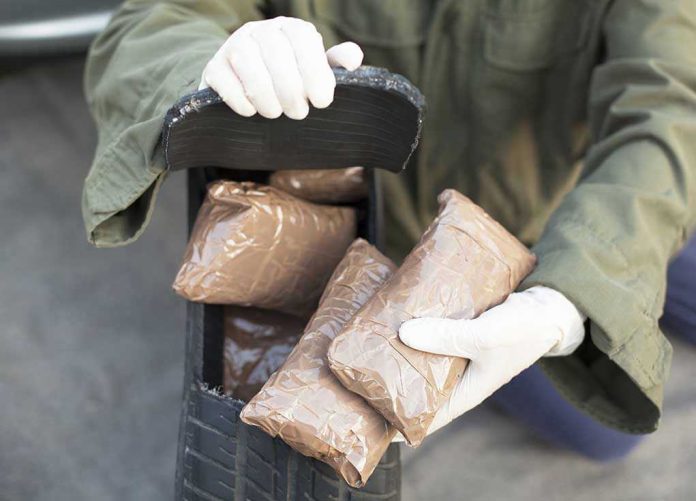
Nearly 900 pounds of methamphetamine were seized in Minneapolis in a single day, exposing the jaw-dropping scale of drug trafficking plaguing the Midwest—and raising hard questions about why this crisis keeps raging despite all the promises from our so-called leaders.
At a Glance
- Authorities in Minneapolis made one of the largest methamphetamine seizures in Minnesota history, taking nearly 900 pounds off the streets.
- The suspects arrested are allegedly tied to a Mexican drug organization, highlighting the ongoing failure to control the border and stop cartel operations.
- This record-setting bust follows a pattern of escalating large-scale drug trafficking operations in Minnesota, fueled by porous borders and weak enforcement.
- The bust was the result of intensive surveillance, undercover operations, and multi-agency collaboration, with officials warning that traffickers will adapt quickly.
Meth Mountain Seized in Minneapolis: A Wake-Up Call
Minneapolis police, with help from federal agencies, seized nearly 900 pounds of methamphetamine during two coordinated traffic stops on July 7, 2025, in what is being called one of the largest narcotics busts in state history. The suspects, Joel Casas-Santiago and Guillermo Mercado Chaparro, allegedly operated as part of a larger Mexican drug cartel network. The sheer volume of drugs—251 pounds in a Jeep and 638 pounds in a pickup—shocked even seasoned law enforcement veterans. A drug ledger and other evidence were also recovered, exposing the businesslike efficiency with which these criminal operations move their poison through our communities.
Public safety officials immediately recognized the haul as a potential game-changer for the region, at least for now. FBI Deputy Director Dan Bongino praised the operation, promising that more actions would follow to crush cartel operations in the Upper Midwest. The Ramsey County Sheriff’s Office declared the seizure “possibly one of the largest meth busts in Minnesota history,” but there’s no time for a victory lap—because the reality is that this bust is just the tip of an iceberg floating north from the chaos at our southern border.
Border Chaos Breeds Cartel Boldness
This record-setting bust did not come out of nowhere. It’s the latest symptom of a metastasizing problem: open borders and soft enforcement that have turned the Midwest into a playground for Mexican cartels. The suspects in this case are directly linked to a Mexican drug organization, and the methods used to conceal and transport the meth—like hiding it in vehicles and using coded ledgers—are straight out of the cartel playbook. The steady stream of massive drug shipments into Minnesota mirrors a national trend, where porous borders have allowed criminal organizations to set up shop in our own backyards, endangering families and overwhelming law enforcement.
Authorities executed this operation using advanced surveillance, undercover buys, and court-authorized tracking. But let’s not kid ourselves: for every bust that lands on the evening news, countless shipments slip through the cracks. Cartels are relentless, adapting their tactics and shifting their routes the moment the heat rises. The fact that this bust followed another 900-pound seizure just weeks prior should raise red flags for anyone who believes the “border is secure” narrative. The Biden administration’s policies have led to over 11 million border encounters since 2021, with criminal aliens flooding into the country and endangering our communities. Even as the current administration touts historic drops in border crossings, the damage is already done—these criminal networks have established deep roots, and each new bust only scratches the surface.
Community Impact and Law Enforcement Frustration
The immediate effect of this operation is the removal of $1.7 million worth of meth from the streets and the disruption of a major supply chain. Local families, already stretched thin by rising crime and the social fallout of drug addiction, may see a temporary reprieve. But those on the front lines know the cartels will simply reroute, innovate, and try again. Law enforcement agencies rightly tout their teamwork and dedication, but they are constantly being asked to do more with less—while politicians in Washington bicker over semantics and push for policies that do nothing but embolden traffickers and criminal gangs.
Judicial outcomes in this case could set important precedents for future prosecutions, but the courts can only do so much when the floodgates remain wide open. Experts warn that major busts like this, while headline-grabbing, often result in rapid adaptation by traffickers rather than permanent reductions in supply. Public health officials continue to call for more resources for addiction treatment and community outreach—yet all the treatment in the world won’t matter if the meth keeps coming across the border by the truckload. It’s a vicious cycle, enabled by government overreach in all the wrong places and neglect where it counts most: protecting American families from foreign criminal networks.














